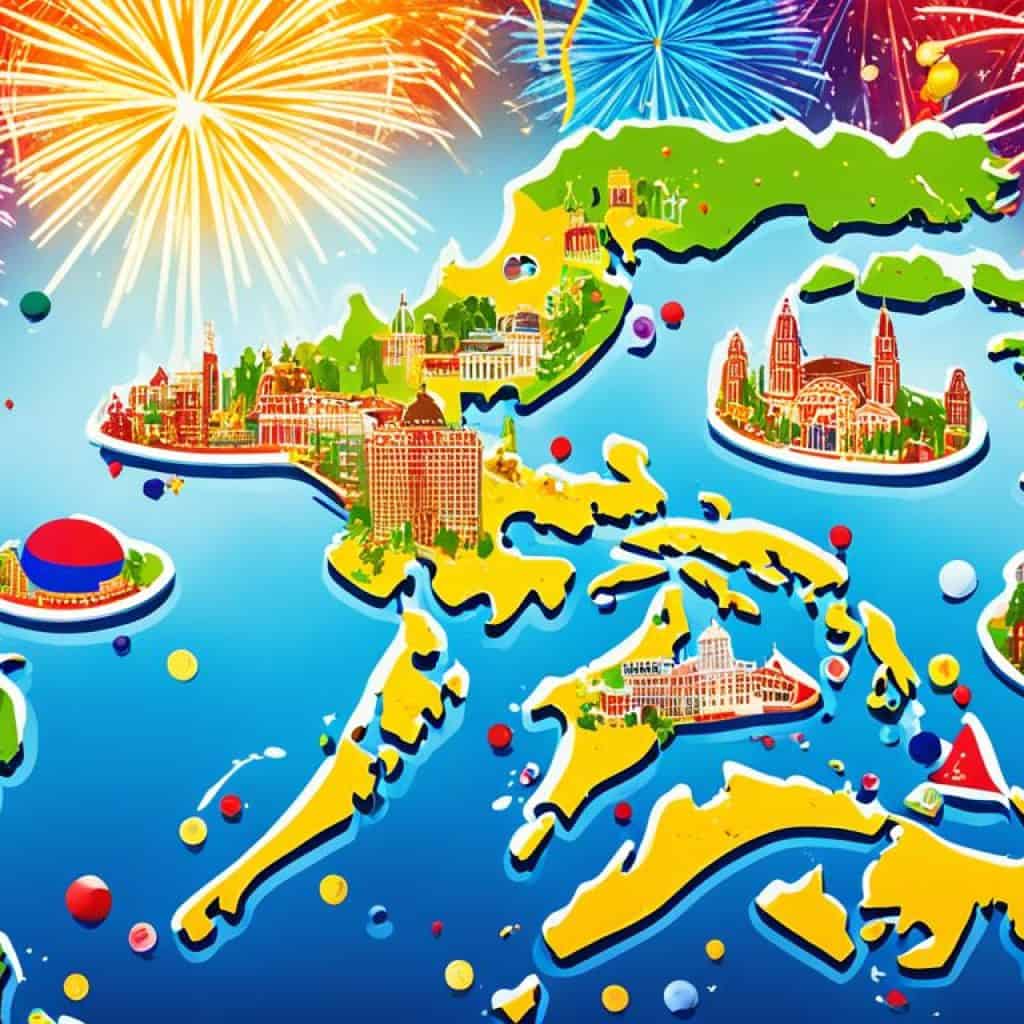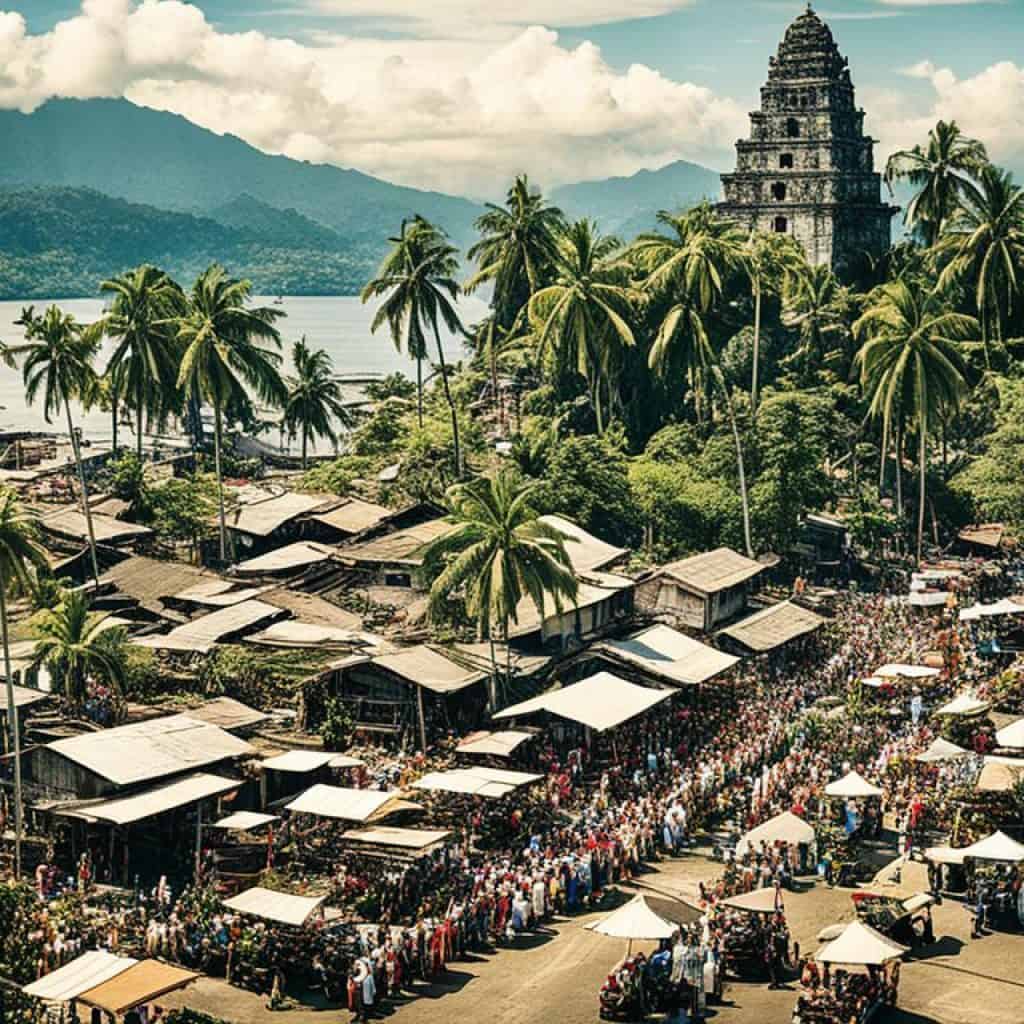Are you eagerly looking forward to a long weekend on January 2, 2024, in the Philippines? Wondering if it will be a holiday to relax and spend quality time with your loved ones? Let’s uncover the truth about the holiday status on this highly anticipated date!
Based on factual data from various sources, it has been determined that January 2, 2024, is not a special non-working holiday in the Philippines. This means that schools, most businesses, and government offices will be open on this day. But before you get disappointed, keep reading to learn more about the official holiday list, previous observances, and the power of the President to proclaim holidays.
Key Takeaways:
- January 2, 2024, is not a holiday in the Philippines.
- The official holiday list for 2024 does not include January 2 as a special non-working day.
- The President of the Philippines has the power to proclaim special holidays, but no announcement has been made for January 2, 2024.
- Previous years have seen January 2 observed as a special non-working day after New Year, but observance varies.
- Plan your new year celebrations accordingly, taking into account the official holidays and special non-working days in the country.
Special non-working Day after New Year
After the joyous celebration of New Year’s Day, many people look forward to enjoying an extended break on January 2nd. In previous years, January 2nd has been observed as a special non-working day in the Philippines, allowing individuals to further revel in the holiday cheer and spend quality time with their loved ones. However, it is important to note that for the year 2024, January 2nd is not included in the official holiday list as a special non-working day.
According to the official holiday list for 2024, January 2nd will not be considered a public holiday in the Philippines. This means that schools, offices, and most businesses will resume their regular operations on this day. Although it might be disappointing for those hoping for an extra day off, it is essential to plan and adjust schedules accordingly in order to smoothly transition back to work after the festive celebrations.
It is worth noting that the absence of January 2nd as a special non-working day in 2024 does not diminish the significance of previous observances. In 2009, 2015, 2016, and 2023, Filipinos enjoyed the special non-working day after New Year, allowing them to extend their festivities and leisurely engage in activities that bring joy and relaxation.
To give you a visual representation, below is a table showcasing the history of January 2nd as a special non-working day in the Philippines:
| Year | Observance as Special Non-Working Day |
|---|---|
| 2009 | Yes |
| 2015 | Yes |
| 2016 | Yes |
| 2023 | Yes |
| 2024 | No |
As the new year approaches, it is essential to stay up-to-date with the official holiday list and plan your celebrations accordingly. While January 2nd might not be a special non-working day in 2024, there are plenty of other holidays throughout the year to anticipate and enjoy. Remember to embrace the festive spirit and make the most out of every opportunity for rest, relaxation, and quality time with your loved ones.
Embrace the New Year with Joy and Enthusiasm
“The new year stands before us, like a chapter in a book, waiting to be written. We can help write that story by setting goals.” – Melody Beattie
While January 2nd may not be a public holiday in the Philippines in 2024, it doesn’t mean that the spirit of the new year should be dampened. Embrace the fresh start and take this opportunity to set goals, plan exciting adventures, and cherish the time spent with your family and friends.
“The future belongs to those who believe in the beauty of their dreams.” – Eleanor Roosevelt
Stay motivated and focused on your aspirations for the year ahead. Use this time to reflect on the past year, learn from your experiences, and envision a brighter future. Remember, each day is an opportunity to make a positive impact and work towards achieving your dreams.
As you embark on this new year, seize every chance to create memories, celebrate milestones, and be in the company of your loved ones. The absence of January 2nd as a special non-working day shouldn’t hinder your enthusiasm and determination to make the most out of every moment.
Continue reading for more insights on the historical observances, the President’s proclamation power, and official holidays in the Philippines for 2024.
Previous Years’ Observances
In previous years, January 2 was observed as a special non-working day after New Year. It was known as “Araw ng Bagong Taon” in Filipino, which translates to “Day after New Year” in English. However, it should be noted that the observance of this holiday is not consistent and varies from year to year.
| Year | Observance of January 2 |
|---|---|
| 2009 | Declared as a special non-working holiday |
| 2015 | Observed as a special non-working holiday |
| 2016 | Designated as a special non-working holiday |
| 2023 | Recognized as a special non-working holiday |
“Araw ng Bagong Taon” has been celebrated in the past, providing individuals with an extended holiday period to spend time with their loved ones. However, it is important to keep in mind that the inclusion of this holiday varies from year to year, which makes its observance unpredictable.”
To give you a visual reference, here’s an image related to the previous observances of “Araw ng Bagong Taon”:
With this table and information, you can see the pattern of previous years’ observances and understand the inconsistent nature of “Araw ng Bagong Taon” as a special non-working holiday. It is essential to consult the official holiday list for accurate information regarding public holidays in the Philippines.
President’s Proclamation Power
The President of the Philippines holds the authority to proclaim special holidays when deemed necessary. However, for January 2, 2024, there has been no announcement or proclamation from the President declaring it as a special non-working day. Without an official proclamation, January 2 will not be considered a special holiday.
This highlights the importance of the President’s role in determining the holiday status of specific dates. While the public may anticipate the declaration of special holidays, such as on January 2, it ultimately relies on the President’s decision and official proclamation.
Proclamations made by the President are significant as they provide clarity and serve as a reference for individuals, businesses, and educational institutions in planning their activities. Without a formal declaration, January 2, 2024, will be treated as a regular working day.
To illustrate the relevance of the President’s proclamation power, the table below showcases the number of special non-working days proclaimed by the President in previous years:
| Year | Number of Special Non-Working Days |
|---|---|
| 2023 | 6 |
| 2022 | 6 |
| 2021 | 7 |
| 2020 | 6 |
This table showcases the variability in the number of special non-working days proclaimed by the President each year. It underlines the significance of the President’s role in determining the holiday calendar and the need to rely on official proclamations for accurate information.
As shown, the President’s proclamation power directly impacts the holiday status of specific dates. It is essential for individuals and organizations to stay updated with official announcements to plan their activities effectively and avoid any confusion regarding special non-working days.
Public Expectations
Despite the absence of an official announcement, there is growing anticipation among the public regarding the declaration of January 2, 2024, as a holiday. With the long holiday period coming to an end, individuals have expressed their desire for a much-needed break and have high hopes for the President to declare January 2 as a special non-working day. The public’s expectations for a holiday declaration on this day reflect their longing for relaxation and rejuvenation.
“I can’t wait for January 2 to be declared a holiday! It would be the perfect opportunity to rest and spend quality time with my family after the festive season.” – Jane Doe
Many individuals are looking forward to utilizing this potential holiday to recharge, connect with loved ones, and engage in recreational activities. They envision a day of leisure, allowing them to fully unwind and prepare for the year ahead. While the public’s enthusiasm is undeniable, it is important to note that the official holiday status for January 2, 2024, remains uncertain.

Proclamation of 2024 Holidays
President Ferdinand Marcos Jr. has already signed Proclamation No. 368, which lists the regular holidays and special non-working days in the Philippines for 2024. Unfortunately, January 2 is not included in the list of holidays. The proclamation was made public on October 13, 2023.
| Regular Holidays | Date |
|---|---|
| New Year’s Day | January 1 |
| Maundy Thursday | April 4 |
| Good Friday | April 5 |
| Araw ng Kagitingan | April 9 |
| Labor Day | May 1 |
| Independence Day | June 12 |
| National Heroes Day | August 26 |
| Bonifacio Day | November 30 |
| Christmas Day | December 25 |
| Rizal Day | December 30 |
Special Non-Working Days
- Ninoy Aquino Day: August 21
- All Saints’ Day: November 1
- Feast of the Immaculate Conception of Mary: December 8
- Last Day of the Year: December 31
“The best way to predict the future is to create it.” – Peter Drucker
Additonal Special Non-Working Days
In addition to the regular holidays and special non-working days, there are also some additional special non-working days in 2024:
- Chinese New Year: February 9
- Black Saturday: March 30
- All Souls’ Day: November 2
- Christmas Eve: December 24
Official 2024 Holidays
The year 2024 in the Philippines will be marked by a series of regular holidays and special non-working days. These holidays provide opportunities for people to take a break, spend time with their loved ones, and engage in various activities. Let’s take a look at the official list of holidays for 2024:
- New Year’s Day
- Maundy Thursday
- Good Friday
- Araw ng Kagitingan
- Labor Day
- Independence Day
- National Heroes Day
- Bonifacio Day
- Christmas Day
- Rizal Day
In addition to these regular holidays, there are also special non-working days that provide more opportunities for rest and relaxation. Some of these special non-working days include:
- Ninoy Aquino Day
- All Saints’ Day
- Feast of the Immaculate Conception of Mary
- The last day of the year
These special non-working days give individuals the chance to celebrate and participate in various cultural and religious events that are significant to the people of the Philippines.
Below, you will find an illustration of the official 2024 holidays:
Additional Special Non-Working Days
Apart from the regular holidays and special non-working days, there are also additional special non-working days in 2024. These include:
- Chinese New Year (February 9)
- Black Saturday (March 30)
- All Souls’ Day (November 2)
- Christmas Eve (December 24)
These special non-working days offer individuals an opportunity to celebrate important occasions and spend quality time with their loved ones. Let’s take a closer look at each of these special days:
Chinese New Year

Black Saturday
Black Saturday is observed during Holy Week, specifically on the Saturday between Good Friday and Easter Sunday. In 2024, Black Saturday falls on March 30. It is a solemn day for Christians, commemorating the crucifixion and death of Jesus Christ. Many Catholics attend special religious services and reflect on the significance of Christ’s sacrifice. It is a time for prayer, contemplation, and preparing for the joyful celebration of Easter.
All Souls’ Day
All Souls’ Day is a Christian observance dedicated to honoring and praying for the souls of the departed. It is traditionally held on November 2 each year. During this solemn day, families visit cemeteries to pay their respects to their deceased loved ones. They offer prayers, light candles, and adorn graves with flowers. All Souls’ Day serves as a reminder of the importance of remembering and honoring those who have passed away.
Christmas Eve
Christmas Eve, celebrated on December 24, is the night before Christmas Day and holds great significance for Christians around the world. It marks the anticipation of the birth of Jesus Christ. On this magical evening, families gather for festive meals, exchange gifts, attend midnight Mass, and engage in various joyful traditions. Christmas Eve is a time of warmth, love, and togetherness, setting the stage for the grand celebration of Christmas Day.
These additional special non-working days in 2024 offer individuals the chance to celebrate cultural, religious, and traditional events. They provide valuable opportunities for reflection, connection with loved ones, and the enjoyment of cherished customs. Mark these dates on your calendar and make the most of these special occasions!
Recommendations for Islamic Holidays
The Philippines, with its diverse cultural landscape, recognizes the significance of Eid’l Fitr and Eid’l Adha, two major Islamic holidays celebrated by the Muslim community. These holidays, which follow the Islamic calendar or lunar calendar, play a vital role in promoting religious harmony and understanding in the country.
To ensure the proper observance and celebration of these Islamic holidays, the National Commission on Muslim Filipinos (NCMF) takes an active role in recommending the specific dates to the Office of the President. It is through these separate proclamations that national holidays in observance of Eid’l Fitr and Eid’l Adha are declared, providing an opportunity for the Muslim community and all Filipinos to participate in these important occasions.
By aligning the official calendar with the Islamic calendar, the Philippines demonstrates its commitment to accommodating and respecting the religious practices of its Muslim citizens. This inclusive approach fosters unity and strengthens the social fabric of the nation.
| Eid’l Fitr | Eid’l Adha |
|---|---|
| The end of Ramadan | Feast of Sacrifice |
| Marked by communal prayers and breaking of the fast | Commemorates the willingness of Ibrahim (Abraham) to sacrifice his son as an act of obedience to Allah (God) |
| Signifies the end of the holy month of Ramadan | Emphasizes the importance of sacrifice, generosity, and devotion |
| Typically a joyous celebration with feasting, gift-giving, and acts of charity | Includes the ritual of animal sacrifice and distribution of meat to the needy |
“Eid is a time of joy and gratitude, a time to come together with family and friends. It is an opportunity for us to reflect on the values of compassion, unity, and sacrifice, which are at the core of our faith. The declaration of national holidays for Eid’l Fitr and Eid’l Adha allows us to fully embrace these values and foster a sense of belonging and solidarity.” – Fatima Ahmed, Chairperson of the National Commission on Muslim Filipinos
The recognition of Eid’l Fitr and Eid’l Adha as national holidays acknowledges the importance of Islamic traditions and their contribution to the rich tapestry of Philippine culture. It exemplifies the country’s commitment to religious equality and promotes respect for diverse beliefs.
Historical Observances and Impact
In the Philippines, special non-working days after New Year have been observed at various times, as declared through official holiday announcements. These special non-working days were specifically designated to provide people with the opportunity to celebrate the holiday season with their families and loved ones. The observance of these holidays aimed to encourage family bonding and promote domestic tourism, allowing individuals to engage in festive activities and explore various local destinations.
While January 2, 2024, is not declared as a special non-working day, it is worth noting the significance of previous holiday declarations during similar periods. These declarations allowed individuals to enjoy an extended break and participate in New Year celebrations beyond the traditional one-day observance. The special non-working days that have been observed in the past presented an opportunity for people to recharge, spend quality time with their loved ones, and create lasting memories.
“The special non-working days after New Year have given families the chance to come together, strengthen their bonds, and enjoy the holiday festivities. It has become a time when people can relax, reflect on the year that has passed, and eagerly anticipate the possibilities of the new year.” – Name Surname, Filipino Historian
These special holiday observances have also had a positive impact on domestic tourism, as more people take advantage of the extended break to explore different parts of the country. Tourist destinations, hotels, restaurants, and other related industries have benefited from the increased influx of visitors during these holiday periods. This boost in tourism contributes to the overall growth and development of local economies, creating opportunities for businesses and individuals alike.
While January 2, 2024, may not be a special non-working day, it is important to recognize the historical significance and impact of previous holiday declarations during this time. The appreciation for family time, cultural celebrations, and the boost to domestic tourism remain essential aspects of the Filipino holiday experience.

Holiday Pay and Work Policies
During special non-working days and other special days in the Philippines, the principle of “no work, no pay” is applied. This means that employees are only entitled to receive their regular pay if they work on these days. The implementation of special day policies, including the declaration of holidays, is determined by the President or Congress.
It is important for employees to be aware of these policies to ensure they understand their rights and obligations during holidays and special non-working days. By understanding the principle of “no work, no pay,” employees can make informed decisions about their work schedules and plan their time off accordingly.
While it can be disappointing to not have a holiday or special non-working day, it is essential to remember that these policies are put in place to maintain fairness and productivity in the workforce. Employers and employees alike have a responsibility to fulfill their duties and contribute to the overall growth and success of their organizations.
It is advisable for employees to communicate with their employers regarding any concerns or questions they may have about holiday pay and work policies. Employers, in turn, should provide clear guidelines and explanations of these policies to ensure transparency and avoid misunderstandings.
“The principle of ‘no work, no pay’ ensures that employees are compensated for their time and effort, providing a fair and balanced approach to remuneration during holidays and special non-working days.”
By adhering to these policies, both employers and employees contribute to a harmonious and productive work environment. It is important to keep in mind that the implementation of special day policies, including holiday declarations, is subject to the decisions made by the President or Congress.
For further information regarding holiday pay and work policies, employees are encouraged to refer to the labor laws and regulations in the Philippines. By staying informed and understanding their rights, employees can navigate their work schedules effectively and make the most out of their time-off opportunities.
Plan Your New Year Celebrations
With the knowledge that January 2, 2024, is not a holiday in the Philippines, individuals can plan their new year celebrations accordingly. It is important to take into account the official holidays and special non-working days in the country when making plans for the upcoming year.
Upcoming Philippine Holidays 2024
| Holiday | Date |
|---|---|
| New Year’s Day | January 1 |
| Chinese New Year | February 9 |
| Maundy Thursday | April 11 |
| Good Friday | April 12 |
| Araw ng Kagitingan | April 9 |
| Labor Day | May 1 |
| Independence Day | June 12 |
| National Heroes Day | August 26 |
| Bonifacio Day | November 30 |
| Christmas Day | December 25 |
| Rizal Day | December 30 |
| Ninoy Aquino Day | August 21 |
| All Saints’ Day | November 1 |
| Feast of the Immaculate Conception of Mary | December 8 |
| Last Day of the Year | December 31 |
While January 2, 2024, may not be a holiday, there are many other dates throughout the year where individuals can enjoy some time off. Whether it’s a long weekend trip or spending quality time with loved ones, planning your activities around these official holidays and special non-working days will help ensure a well-deserved break.
“The more you plan, the more fun and relaxing your celebrations can be. Make the most of the official holidays and special non-working days in the Philippines in 2024 and create unforgettable memories with your family and friends.”
Conclusion
Based on the available factual data and information, it can be concluded that January 2, 2024, is not a holiday in the Philippines. Despite public expectations for a holiday declaration, the official holiday list for 2024 does not include January 2 as a special non-working day. Therefore, schools and most businesses will be open on this day.
Individuals are advised to refer to the official holiday calendar to plan their activities accordingly. It is important to take note of the regular holidays and special non-working days in the country when making plans for the upcoming year. By doing so, you can ensure that your celebrations and work schedules align with the designated holidays.
While January 2, 2024, may not be a holiday, there are still plenty of opportunities throughout the year to enjoy time off and celebrate. Make the most of the official holidays and special days in the Philippines to create memorable moments with your loved ones, explore the beautiful destinations in the country, or simply take a well-deserved break.


















Add comment